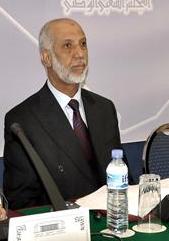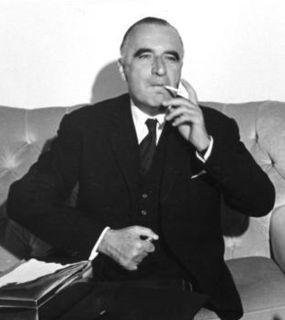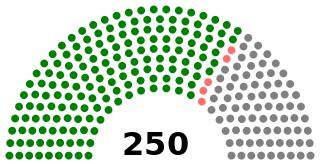Plaid Cymru is a social-democratic political party in Wales advocating Welsh independence from the United Kingdom within the European Union.

The Workers' Party is a Trotskyist political party in Algeria, closely linked with the Independent Workers' Party of France. The party is led by Louisa Hanoune.

The Supreme People's Assembly is the unicameral legislature of the Democratic People's Republic of Korea (DPRK), commonly known as North Korea. It consists of one deputy from each of the DPRK's 687 constituencies, elected to five-year terms.

Abdelaziz Belkhadem is an Algerian politician who was Prime Minister of Algeria from 2006 to 2008. He was also Secretary-General of the National Liberation Front (FLN). Belkhadem served as Minister of Foreign Affairs from 2000 to 2005 and Personal Representative of President Abdelaziz Bouteflika from 2005 to 2006; after serving as Prime Minister from 2006 to 2008, he was again appointed as Personal Representative of the Head of State in 2008.

Algeria elects on national level a head of state - the president - and a legislature. The president is elected for a five-year term by the people. People's National Assembly has 462 members, elected for a five-year term in multi-seat constituencies by proportional representation. Eight seats in the national assembly are reserved for Algerians abroad. The Council of the Nation has 144 members, 96 members elected by communal councils and 48 members appointed by the president. Algeriawesh alors has a multi-party system, with numerous parties in which no one party often has a chance of gaining power alone, and parties must work with each other to form coalition governments. According to a US Embassy cable, the 2009 presidential elections were "carefully choreographed and heavily controlled", with the official turnout figure "exaggerated" by at least 45%.

Elections in North Korea are held every four-to-five years for the Supreme People's Assembly (SPA), the country's national legislature, and every four years for Local People's Assemblies.

The Council of Representatives is the unicameral legislature of the Republic of Iraq. It is currently composed of 329 seats and meets in Baghdad inside the Green Zone.

The Parliament of Egypt is currently a unicameral legislature. The Parliament is located in Cairo, Egypt's capital. Under the country's 2014 constitution, as the legislative branch of the Egyptian state the Parliament enacted laws, approved the general policy of the State, the general plan for economic and social development and the general budget of the State, supervised the work of the government, and had the power to vote to impeach the President of the Republic, or replace the government and its Prime Minister by a vote of no-confidence.

French legislative elections took place on 18 November and 25 November 1962 to elect the second National Assembly of the Fifth Republic.

Francisco Guterres, popularly known as Lú-Olo, is an East Timorese politician who has been President of East Timor since 2017. He is also the President of Fretilin, and he was President of the National Parliament of East Timor from 2002 to 2007. As the Fretilin candidate, he stood in the 2007 presidential election and 2012 presidential election, but was defeated in the second round by independent candidates on both occasions. He also contested the 2017 presidential election, and with the support of former Prime Minister Xanana Gusmão and his party, National Congress for Timorese Reconstruction (CNRT), he was elected as President.

The 2002 Algerian Legislative election was held in Algeria on 30 May 2002 to elect members of the People's National Assembly. The governing National Liberation Front (FLN) won a majority of seats in the election. The election suffered from a low turnout, violence and boycotts by some opposition parties.

General elections were held in Pakistan on 16 November 1988, electing the 336 members of the National Assembly and 100 members of the Senate. The Pakistan Peoples Party (PPP), led by Benazir Bhutto, beat the technocratic military government of dead General Zia-ul-Haq, winning 94 of the 207 seats in the National Assembly. This was the second of four non-consecutive victories for the PPP and saw Benazir became Pakistan's – and the Muslim world's — first female head of government. Nawaz Sharif took the office of Leader of Opposition

In Yugoslavia, elections were held while it had existed as the Kingdom of Yugoslavia, the first one being in 1918 for the Provisional Popular Legislature of Serbs, Croats and Slovenes and the last being the parliamentary election of 1938. Women were not eligible to vote. After the 1918 indirect ones, the 1920 parliamentary election was the first direct one. Parliamentary elections were held in 1923, 1925 and 1927, while with the new constitution a de facto Lower and Upper House were introduced in 1931. The 1931 elections were not free, as they were handled under a single-course dictatorship, while the 1935 and 1938 were held under limited basic democratic principles.

Parliamentary elections were held in Nigeria on 9 April 2011.

A parliamentary election to the Syrian People's Council was held in Syria on 7 May 2012, following the approval of a new constitution of Syria, in a referendum on 26 February 2012.

Parliamentary elections were held in Libya on 25 June 2014 for the House of Representatives. Whilst all candidates ran as independents, the elections saw nationalist and liberal factions win the majority of seats, with Islamist groups being reduced to only around 30 seats. Election turnout was very low at 18%.

A legislative election was held in Algeria on 10 May 2012. The incumbent coalition, consisting of the FLN of President Abdelaziz Bouteflika and the RND of Prime Minister Ahmed Ouyahia, held on to power after winning a majority of seats. The Islamist parties of the Green Algeria Alliance lost seats.

General elections were held in the Bahamas on 10 May 2017. The elected members of the House of Assembly then elected the Prime Minister.




















